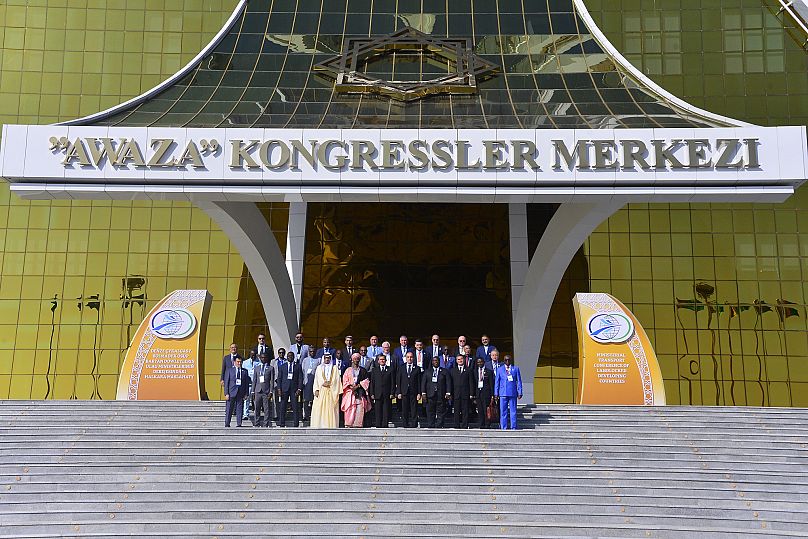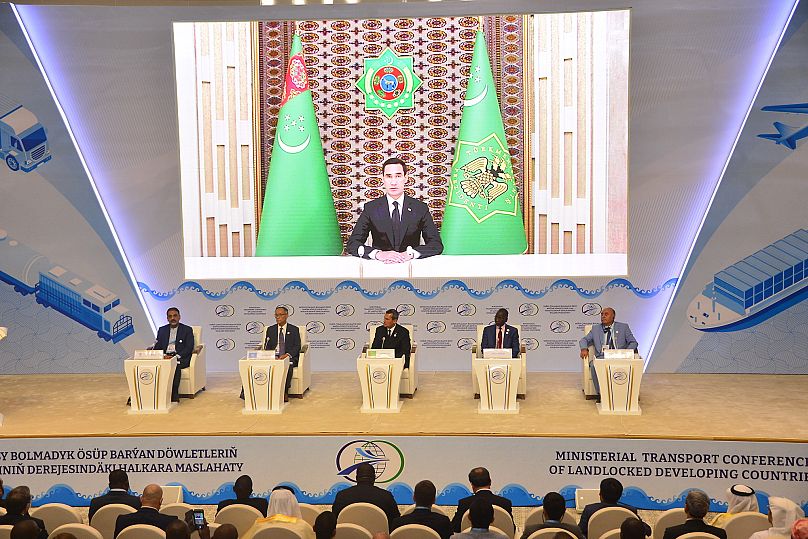In times of ongoing turbulence, encompassing the conflicts, economic hardship and pandemics, landlocked countries face a unique set of challenges. Exports fall sharply, and imports are especially prone to delays and higher costs.
For example, during the COVID-19 crisis, when international borders were closed, many of the least developed landlocked countries (LLDCs) struggled to get hold of personal protective equipment or ventilators. These countries are also more vulnerable to the effects of climate change, since natural disasters have huge knock-on effects for transport infrastructure and services.
To address these kinds of challenges and seek solutions through international cooperation, the government of Turkmenistan organised a two-day conference in collaboration with the UN Office of the High Representative for the Least Developed Countries, Landlocked Developing Countries and Small Island Developing States.
Working together to face current challenges
Titled “Ashgabat Process: Financing for Better Connectivity”, the conference took place on August 15-16 in Awaza, in the city of Turkmenbashi, Turkmenistan, and formed part of the preparatory process for the UN Conference on LLDCs in 2024. High-ranking representatives of governments, international organisations, private sector and other stakeholders from more than 30 countries attended, in person and virtually.
Speakers presented a wide range of topics, from integrated multimodal transport systems to how best to deal with the effects of climate change – as well as best practices to minimise environmental damage. Natural disasters, higher temperatures, melting permafrost, desertification and changing precipitation patterns are all factors that have a disproportionate effect on landlocked countries.
Discussions were also held on the current state of air, road, rail and sea transport, and on recent innovations in the transport sector worldwide. The realities of financing were laid bare: an estimated US$500 billion will be needed to construct the more than 46,000 kilometres of railway and nearly 200,000 kilometres of paved road that LLDCs require if they are to meet global average density.
The central objective of the conference was to strengthen international cooperation to create a framework of sustainable transport for those LLDCs that have traditionally had to rely on their neighbours to take part in trade with other countries. Over the last few years Turkmenistan has been instrumental in the creation of UN resolutions promoting global collaboration to create transit corridors.
In his opening speech, President of Turkmenistan Serdar Berdimuhamedov outlined his proposal to create a UN special working group to protect the transport sector interests of LLDCs, and an appeal to the UN to help develop their role internationally.
“We consider it timely to start developing a resolution of the UN General Assembly on enhancing the role of landlocked developing countries in the development and strengthening of global transport cooperation,” he said.
The UN Secretary General António Guterres had sent his support in a written message, which also emphasised the importance of joint action to overcome an inadequate transport infrastructure, as well the complexity of border procedures and administration.
Referring to the aftermath of COVID-19, Guterres said “the ensuing economic slowdown has curtailed the ability of governments to finance long-term infrastructure projects. We must work together to get transport back on track.”
Drawing on its heritage, Turkmenistan is uniquely positioned to change the future
Over half a billion people live in the 32 LLDCs, and each of these countries suffers from elevated trading costs, in many cases up to 1.4 times higher than in countries with direct access to the sea. These costs result not only from the geographical constraints, but from poorly developed transit networks.
The future economic stability of less wealthy landlocked countries rests on the innovation and technology that can only be achieved with international partnerships. Without appropriate and sustainable transport systems, it is difficult to reduce poverty levels or stimulate economic development.
Deputy Chairman of the Cabinet of Ministers and Minister of Foreign Affairs of Turkmenistan, Rashid Meredov, said “Only through solidarity and mutual understanding and cooperation between our countries will we accomplish the connectivity needed to put us back on track towards the achievement of the priorities of the Vienna Programme of Action and the Sustainable Development Goals.”
For many centuries, Turkmenistan was central to the development of global trade routes when its territories were crossed by the Great Silk Road. It seems fitting, then, that the country should once again play a vital role in expanding trade connections.



